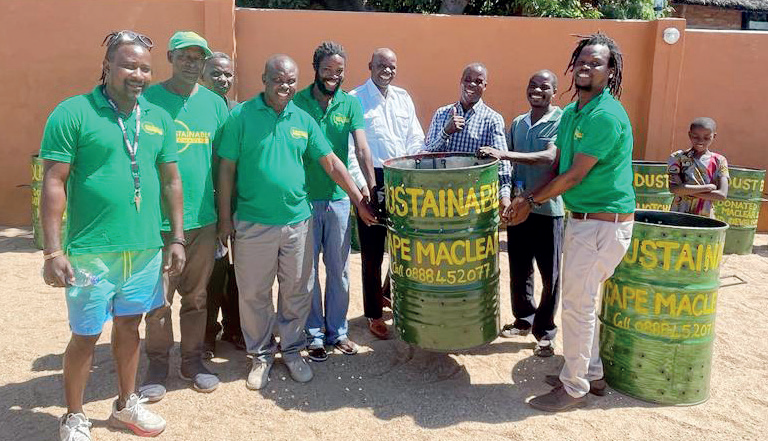By James Chavula
Copyright mwnation

From Peter Mutharika Highway, visitors entering Mangochi Town along Lake Malawi are greeted by sights of waste dumped in what used to be a stunning yellow-barked acacia forest.
The filthy heaps in the vanishing fever trees, scientifically known as Acacia xanthophloea, have been growing for over a decade.
The sight along the road linking Mangochi and Liwonde towns notoriously repeats itself across Malawi where waste piling in wrong places shows you are approaching an urban setting.
“It’s ironic that both residents and local authorities seem to find it OK to heap waste by the gateway to the country’s most visited tourist destination,” says Mangochi resident Michael Mwale.
As authorities seldom invoke polluter-pays laws, few people in the country seem to care where they throw garbage.
Investment in waste management systems remains scanty nationwide, with no district, city or town owning facilities fit for the purpose.
Meanwhile, the wanton dumping of waste upsets some travellers destined for the wonders of the Warm Heart of Africa.
‘Our lives hinge on it’
The waste crisis has jolted some concerned residents of Cape Maclear in the district along the southern shoreline of Lake Malawi to do something about it.
For five years, Sustainable Cape Maclear member shave been picking plastics for fashioning usable props, including sandals, necklaces, bracelets, postcards and other jewels from the dumps.
A dozen of self-styled clean minds, they have become frontline marchers to tackle plastics polluting the lake.
They collect plastics and other recyclable waste from the palm-fringed beaches, resorts, restaurants, rock outcrops, starry waters, postcard islands, homes and markets.
The group of 12 is among eight initiatives that received K220 million from the Malawi Environmental Endowment Trust (Meet).
They planned to use the K5 million to buy a loudspeaker for mass awareness outreach and 50 bins to be installed in the Lake Malawi National Park.
“Cape Maclear is the country’s only village in the middle of a national park, so our lives and businesses hinge on the lake. Sadly, we don’t have systems that can sustainably handle mounting waste amid rapid population boom,” says team leader John Banana Matewere.
Lake Malawi National Park is uniquely dotted with three villages.
The marine life sanctuary boasts abundant colourful mbuna cichlids, some of over 700 fish species that call the freshwater lake home.
Sustainable Cape Maclear works with fishers, beach village committees, curio sellers and natural resources committees to keep the tourist spot clean and healthy for all.
“It is not easy to keep the cape and its attractions spotless and attractive for residents, tourists and our business. Our goal is to protect the lake and all businesses for our good and generations to come,” says Matewere.
Cape Maclear’s waste crisis is partly fuelled by population boom, the tour guide observes.
“The population has surged from about 5000 in all the three villages to up to 20 000 per village. So has the waste we churn out,” he says.
From Songwe at the northern tip to Cape Maclear at the southernmost point, Lake Malawi welcomed about 740 000 tourists in 2022, according to Malawi Tourism. The official figures show nationwide travel injected K18.3 billion into the local economy.
The Ministry of Finance and Economic Affairs rates tourism as a vital cog in the gears for economic recovery and growth alongside agriculture and manufacturing.
Bureaucrats prefer calling it the ATM strategy, but environmentalists say sustainable environmental and waste management is part of the deal.
“Tourism is not just attracting visitors to fill our hotels, but also keeping our attractions clean, healthy and conducive for everyone to experience our country. How can we attract tourists to spend in our country if we turn our attractions into dumpsites?” asks Meet national coordinator Karen Price.
The trust, which supports organisations that promote sustainable environmental management, has backed the Cape Maclear clean-up campaign.
Time to join in
Price dialled up calls for a stop to indiscriminate waste disposal along Lake Malawi and surrounding places to go, including the sole marine life sanctuary.
She states: “Ours is a plea for the private sector to join Sustainable Cape Maclear in keeping Lake Malawi clean. They need support to collect all the waste polluting the national park.
“We need 50 drums to keep Lake Malawi as clean as possible. Donate a 200-litre drum and we will acknowledge your contribution by putting your company logo on it.”
The cost of a drum has more than doubled from K60 000 within a year, reducing the grants buying power.



